Herd immunity: A fallacy or the unavoidable reality?
Immunization programmes require massive funding, infrastructure & staffing, and WHO has expressed concerns about the effectiveness of herd immunity. However, the success of vaccines in mitigating effects of pandemics cannot be blatantly ruled out.
- Several nations are now unlocking their economies. As people step out of their homes the need to safeguard them has increased and so have the efforts to develop a vaccine against the virus.
- Taking note of this situation, the World Health Organisation (WHO) cautioned alarm about the challenges associated with herd immunity.
- Funding for infrastructure (e.g. cold-chain maintenance), purchase of vaccines and adequate staffing are some of the challenges that it encompasses.
- However, vaccination makes good economic sense, and in the long run leads to saving lives and livelihoods.
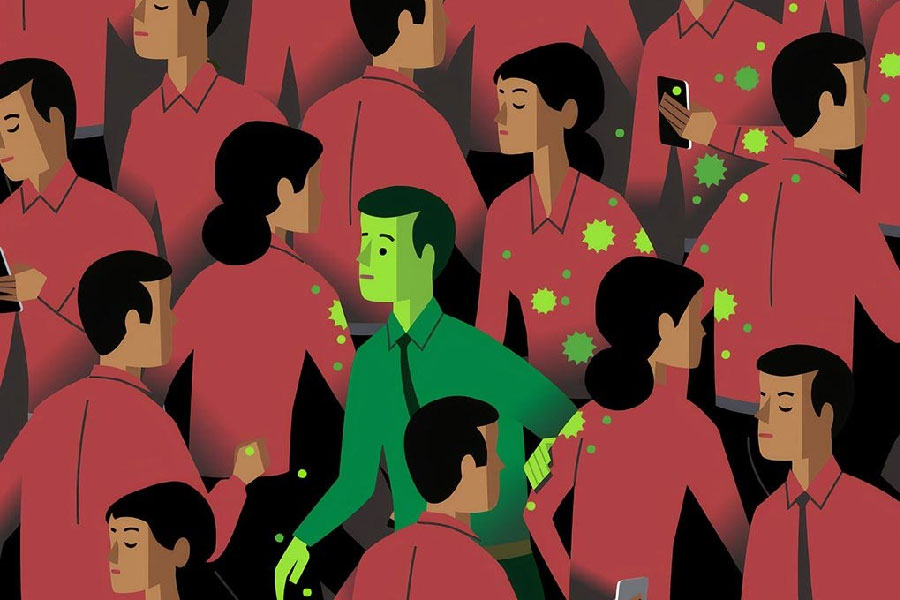
Image Credit : https://bit.ly/2FJaxyu
Slowly & steadily various countries are opening up their economies. This has made it urgent for the scientific community across the world to find a cure for the vaccine. There seems to be a consensus across the world that vaccines are the best bet to fight COVID-19. Mass immunizations are being seen as the fastest way to attain herd immunity – in which a high percentage of the community is immune to a disease (through vaccination and/or prior illness), making the spread of this disease from person to person unlikely. This approach raises a lot of essential concerns which this article attempts to answer – What is the need for a COVID-19 vaccine? What are the scientific & practical considerations surrounding it? How feasible is it to administer the vaccine? Lastly, is the vaccine a panacea for the pandemic?
Vaccine: A quick fix for the diseased people & the bleeding economy
Millions of people across the world have lost their lives due to the onset of COVID-19, with the US, India, Brazil, Russia and Argentina making up for most of this disease burden. In addition, the pandemic has also ravaged economies all over the world.
World Bank president David Malpass called COVID-19, one of the deepest recessions since the Great Depression (1930s). The IMF, too, resonated the sentiment when it estimated that the global economy is expected to shrink by over 3% in 2020 – the steepest slowdown since the Great Depression. As businesses shut shop, people all over the world lost jobs. The ILO estimates that 400 million full-time jobs were lost in the year’s second quarter (April-June 2020). The agency anticipates that the onset of the second wave of the pandemic may force several countries may enforce restrictions again, leading to the loss of about 340 million full-time jobs.
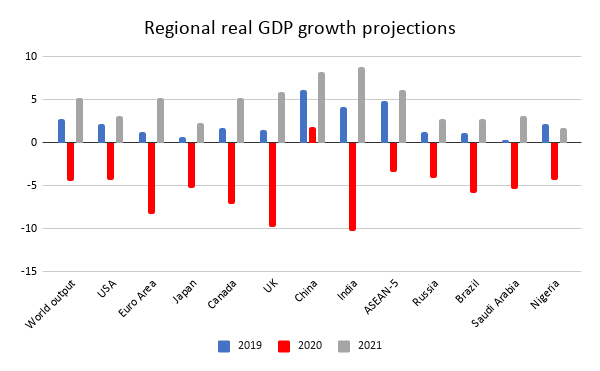
Source: IMF
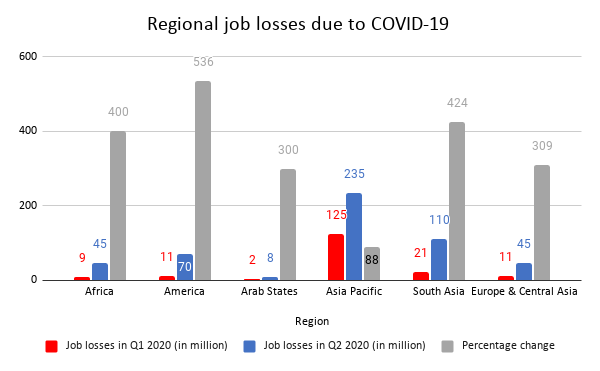
Source: ILO
Countries across the world realised that they can no longer sit back and watch their economies crumble and that sooner or later, they need to get back to business. As economies were unlocked, the need to protect the lives of the workforce became even more urgent and a vaccine race commenced in a bid to find the fastest and most effective cure for the virus. Different countries like the United States of America, the United Kingdom and India began considering the idea of universal immunization programmes to cultivate herd immunity to protect their people from the pandemic, once the vaccine is developed.
Herd immunity: More than an ethical issue
Taking note of this situation, the World Health Organisation (WHO) cautioned about the challenges associated with herd immunity. Calling it an ethical problem, the WHO stated:
(i) As different people have different immune responses, there’s ambiguity about immunity to COVID-19.
(ii) The virus has lapsed in some individuals who were previously infected by it.
(iii) Letting the virus circulate unchecked might lead to recurrent epidemics, suffering, disease & death.
(iv) While certainly the elderly is a high-risk group, they are not the only ones at risk of losing their lives. For example, those living in unhygienic slums and those who step out to work are equally susceptible. So, how then, do governments decide which group needs to be prioritised?
(v) Given that the long-term health impacts of coronavirus are still not very well known, it would be unethical to let the virus run unchecked.
In addition to the above apprehensions, there is the realistic challenge that immunization programmes require massive funding for infrastructure (e.g. cold-chain maintenance), purchase of vaccines and adequate staffing. For example, India, which is regarded as one of the largest vaccine producing country & was once the fastest growing economy in the world, has seen its GDP decline significantly owing to the pandemic. It is estimated that it could require over US$ 10 billion in the first year of the immunization programme itself. Secondly, according to media reports, India has only 80,000 cold storage units that are used for vaccination. It needs around ten times this capacity for mass immunisation against COVID-19. At the same time, these units need to maintain extremely low temperatures (-70°C), which they currently do not have. Lastly, there is a deficiency of doctors & nurses in the country. There is one doctor for every 1,445 Indians, against the 1:1000 ratio prescribed by the WHO.
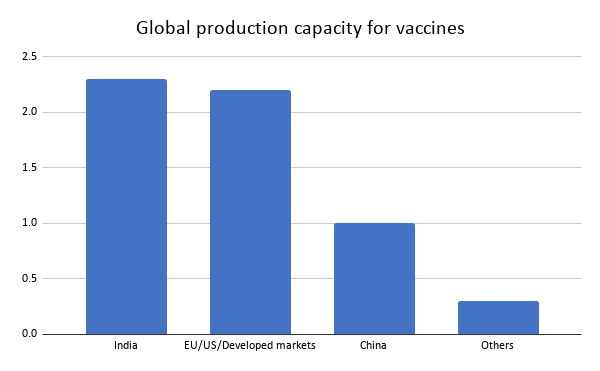
Source: Media Reports
Herd immunity: A ray of hope?
However, the success of vaccines in reducing the burden of contagious disease cannot be blatantly ruled out.
(i) Mass vaccinations have proved quite effective in controlling the spread of diseases like polio and measles.
(ii) Several independent experts as well as the WHO have shown that vaccines are far safer than therapeutic medicines.
(iii) The widespread use of vaccines have even led to the global (e.g. small pox) and local (e.g. elimination of measles from the Americas) eradication of diseases.
(iv) Studies estimate that vaccines annually prevent almost 6 million deaths worldwide.
(v) Studies from Germany & Senegal show that even if a particular disease recurs in those who have been vaccinated, it recurs in a milder form in them.
(vi) Though immunization programmes entail massive health spending by governments, the mortality and morbidity prevented translates into long-term cost savings and potential economic growth. J. Ehreth (2003) projected global the savings from vaccines to be of the order of tens of billions of US dollars of direct savings.
Once developed, a successful COVID-19 vaccine will effectively stimulate the body’s immune system to create antibodies that protect an individual against COVID-19. Thus, it seems that a vaccine seems to be an effective precaution against the pandemic.
Some of the COVID-19 vaccine developers in the world:
| Vaccine name | Developer details | Stage of clinical trial |
| MRNA VACCINE | Moderna & NIAID (USA) | Phase 3 trial |
| CoronaVac | Sinovac Biotech (China) | Phase 3 trial |
| N.A. | Sinopharm (China) | Phase 3 trial |
| Ad5-nCoV | CanSino (China) | Phase 3 trial |
| Sputnik V | Gamaleya (Russia) | Phase 3 trial |
| ChAdOx1 | University of Oxford, CEPI and AstraZeneca (UK) | Phase 3 trial |
| BNT162 | Pfizer & BioNTech (Germany) | Phase 2 & 3 trial |
| Covaxin | Bharat Biotech, ICMR & NIV (India) | Phase 1 & 2 trial |
| ZyCov-D | Zydus Cadila (India) | Phase 1 & 2 trial |
| CVnCoV | CureVac (Germany) | Phase 2 trial |
| NVX-CoV2373 | Novavax (USA) | Phase 2 & 3 trial |
| N.A. | AnGes & Brickell Biotech, Inc. (Japan) | Phase 1 & 2 trial |
| GX-19 | Genexine, Binex, GenNBio (South Korea) | Phase 1 & 2 trial |
| V451 | University of Queensland, CEPI & CSL Ltd. (Australia) | Phase 2 & 3 trial |
| GRAd-COV2 | ReiThera (Italy) | Phase 1 trial |
Source: Media reports
Vaccine a panacea for all woes?
Finding a cure for COVID-19 is like shooting at a target in the dark. Different nations around the globe are trying their best to contain the virus and find a cure for it – leading to massive efforts to develop a vaccine for it. While there are a number of concerns about the safety of using vaccines as a form of treatment, past studies have showed that the benefits of vaccination extend beyond prevention of specific diseases in individuals. Vaccination makes good economic sense, and in the long run leads to saving lives and livelihoods.
However, there still remain several issues related to the feasibility of their mass administration. Countries need to ramp up their cold storage network in according with the requirements of the vaccine. Secondly, governments can explore various options to mobilise funds for carrying out universal immunization drives – disinvestments in public assets, borrowing from multilateral associations like the World Bank or the IMF or through a covid cess. Lastly, massive drives to train chemists or to turn public places into COVID vaccination booths can be explored to eradicate this disease successfully.










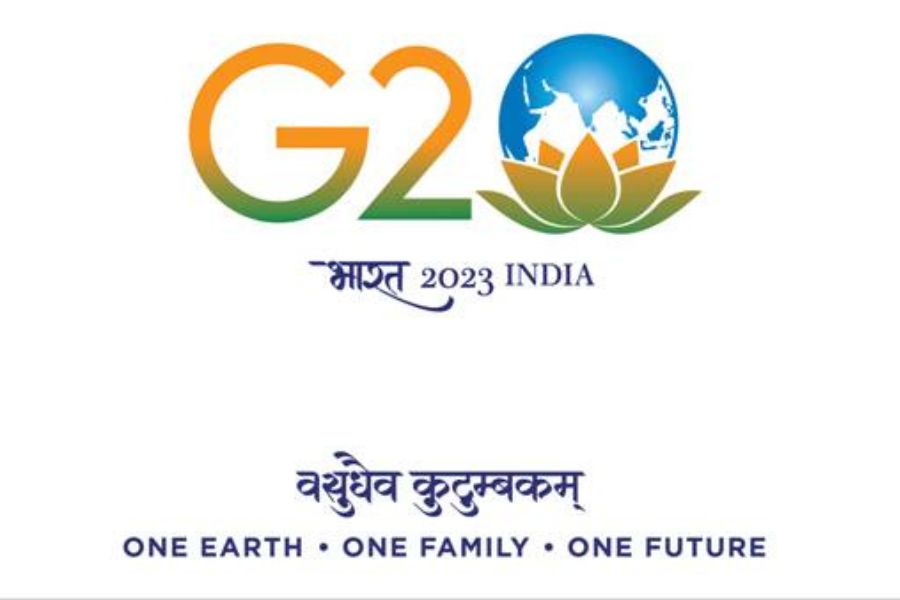
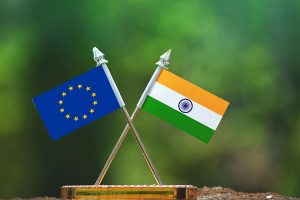

I don’t think I’ve read through anything like this before. So great to discover someone with some original thoughts on this subject. Seriously.. thank you for starting this up. This web site is something that is needed on the internet, someone with a little originality!